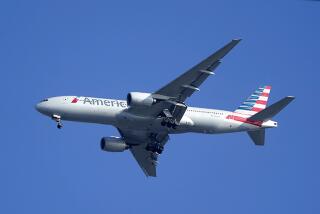YOUR MONEY : Indirect Frequent-Flier Tax Slips In Under Public Radar
For a long time, Uncle Sam has been eyeing your frequent-flier points, and now he’s found a way to tax them--at least indirectly.
Because of a little-noticed provision in the balanced-budget bill passed recently by Congress, the federal government will impose a 7.5% excise tax on the sale of frequent-flier miles by airlines to credit card companies, hotels and countless others that use the points as marketing incentives.
That is not a direct tax on consumers, but many people fear they will ultimately bear the cost. Further, opponents say it’s a dangerous precedent that could open the door for the Internal Revenue Service to impose an income tax on the highly popular frequent-flier miles--whether they’re used or merely accumulated--as well as other giveaways.
“Clearly the IRS for a long time has wanted to tax miles as income, but they realize that politically that’s a nonstarter,” said David H. Miller, an attorney for the newly formed Coalition Against New Taxes on Frequent Flyer Programs, based in Washington. “So they’ve attempted to use the intermediary as a way to collect that tax.”
Frequent-flier programs, which were introduced by American Airlines in 1981, were designed to create passenger loyalty by giving repeat customers free trips or seating-class upgrades. Today, nearly every airline has such a program, and about 8% of all airline passengers travel on tickets obtained with frequent-flier points.
Equally significant, however, are corporate tie-ins allowing fliers to earn points by using an affinity credit card, placing a long-distance call, renting a car or staying at a hotel, among other activities. Today, a third of all frequent-flier miles are awarded through such incentive programs.
Companies such as banks and hotels purchase frequent-flier miles from airlines at cost, roughly 1.6 cents a mile. That produces about $1.5 billion a year for the airline industry, with the lion’s share going to larger carriers that sell frequent-flier points to virtually any company, according to Randy Petersen, publisher of Inside Flyer magazine.
Neither airlines nor affinity companies, such as NationsBank, are sure how they might handle the new tax. “It’s too early for us to tell,” said David Castelveter, a spokesman for Arlington, Va.-based US Airways.
Airlines could decide to pass the tax directly to companies or cover it by tacking on a nontaxable administrative fee and then reducing the cost of points. Some speculate, however, that the carriers might absorb the cost of the tax and try to recoup it directly from passengers.
“I heard an ugly rumor that one airline was thinking they’d pay the tax, not pass it along [to companies] and then introduce a user fee on any frequent-flier awards that got redeemed,” Petersen said. “That obviously wouldn’t be considered consumer-friendly.”
In the final days of the complex tax debate in Washington, the excise tax went virtually unnoticed by the airlines, which were focused on a broader measure to restructure the existing 10% ticket tax. “Most members of Congress were not even aware it was in the bill,” Miller said.
With Congress struggling to reduce the deficit and balance the budget, proponents of the excise tax say frequent fliers--who now avoid the flat ticket taxes used to pay for airport costs--would begin paying their fair share.
Shortly before the bill was passed, opponents rallied to insert language that would permit the IRS to exempt frequent-flier points used for services other than transportation. Hotels, for instance, often buy points and allow guests to convert them to free stays or meals.
The Treasury Department is reviewing the proposed exemptions. Meanwhile, however, the IRS plans to start collecting Oct. 1. “At this point, nobody knows what the impact will be,” Miller said.
The tax could have a devastating impact on discretionary flying and the travel industry, he said, and it could set a precedent for taxing other marketing schemes, such as car rebates and 2-for-1 deals.
More to Read
Inside the business of entertainment
The Wide Shot brings you news, analysis and insights on everything from streaming wars to production — and what it all means for the future.
You may occasionally receive promotional content from the Los Angeles Times.










